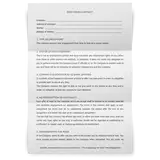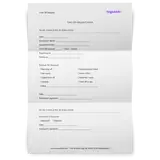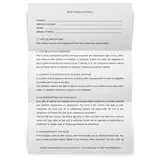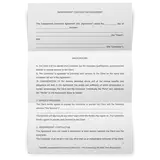A cease and desist letter—not to be confused with a cease and desist order, is a document issued to an entity, i.e., a business or individual, urging them to stop an illegal or suspicious activity and refrain from repeating it.
The document may come with a warning of an impending lawsuit should the recipient fail to discontinue the specified suspicious activity or take a particular action within the stipulated deadlines.
The prevailing perception around cease and desist letters is that they’re exclusively used in the intellectual property landscape, especially in copyright infringement, which isn’t entirely accurate.
While they’re frequently used in disputes surrounding intellectual property law, they’re also used in other situations, e.g., cease and desist letter for harassment, defamation, debt creditors etc.
In intellectual property law, the owner of a patent or trademark can send a cease and desist letter for copyright infringement informing the recipient of the owner’s rights, disclose their identity and alert them of their intention to pursue legal action.
Cease and desist letters may be a lawsuit threat or it may come with a licensing offer. While a cease and desist letter can sometimes lead to licensing negotiations, more often than not, it’s a precursor to litigation.
There are instances where it's used as a tool to intimidate recipients—a somewhat effective one, to silence gripe site operators by alleging defamation, copyright and trademark infringement. Stick around for free sample cease and desist template at the bottom of this post.
Here’s a sample cease and desist template that can be easily customized and adapted to either of the above situations. It’s free to download and use.
Overview of the Types of cease and desist
There are two forms of cease and desist, an order or letter.
A cease and desist order is an injunction typically issued by a judiciary body, e.g., a court to discontinue an illegal or suspect activity while a cease and desist letter is written by a lawyer and its usually the first official step in getting an entity to stop its illegal activity.
Understanding a cease and desist order
Cease and desist order imposes a court-ordered injunction on an entity to suspend alleged illegal activity. It can take two forms; a temporary injunction before litigation or it could be a permanent injunction after judicial proceedings are over.
It’s a legally binding document regardless of the form it takes i.e., whether permanent or temporary. As we’ve already mentioned, it’s usually issued by a court or government agency when there is enough reasonable suspicion that a harmful or illegal activity is occurring and requires the offender to stop.
It may escalate to a point where legal action is necessary, but sometimes, depending on the situation, it may just be a permanent injunction.
Understanding a cease and desist letter
The main distinction between a cease and desist letter and order is legal power. Unlike the order, a cease and desist letter isn’t legally binding but a reflection of opinion, typically that of a lawyer.
It’s issued as a warning to the recipient to stop a specific illegal activity before legal action is taken if they don’t comply. Cease and desist letters generally have a response deadline, which ranges anywhere from 10 to 15 days.
That being said, the letter has to comply with the laws of the recipient’s jurisdiction to be valid.
What’s more, according to the American Bar Association, attorneys are not allowed to present, be involved in presenting, or threaten to dispense criminal charges with the sole aim of gaining an advantage in a civil case. Such threats have no legal implication aside from being a negotiation strategy.
Cease and desist letters typically require a delivery confirmation signature and are mailed with a request for a return receipt though it’s not a requirement.
When you should use a cease and desist letter
Our cease and desist letter templates only need a tad bit of information to complete. That said, the burden of proof lies with you; it’s up to you to collect enough evidence to prove you’re being harassed or that criminal activity has occurred.
Here are a couple of situations of when to use a cease and desist letter:
- A debt collector is harassing you
- You’re having boundary or property disputes
- You’re being harassed, and you want to put an end to it formally
- You’re the victim of intellectual property infringement
- Your work is being plagiarized
- You’re the victim of a contract breach
What are the legal criteria for cease and desist letters
All licensed attorneys in the U.S are bound by the professional code of conduct as stipulated by the ABA, which states that they can’t be involved in issuing or threatening to put forward criminal charges to get the upper hand in a civil suit.
To that end, there is a set of three conditions that must be satisfied before a lawyer can bring up the prospect of presenting charges without going against ABA’s professional code of conduct. These include:
Criminal charges should be closely related to the current civil case.
The legal system doesn’t take it too kindly when individuals or entities try to game the system to gain an advantage in a civil matter by presenting criminal charges that are unrelated to the civil case.
Any attorney found guilty of breaching trust by making false claims or misrepresenting cases with malicious intent will be severely punished.
The lawyer should believe the civil matter, and the present charges should have merit.
Unfounded civil claims or claims lacking merit risk exposing the lawyer to embarrassment counterclaim allegations by the recipient of the cease and desist letter.
Aside from making unfounded claims, should the lawyer violate the rights of the letter’s recipient to acquire evidence, they’ll be violating ABA’s code of professional conduct.
Lawyers shouldn’t try to influence legal proceedings improperly.
Any attorney suspected of trying to influence the outcome of legal proceedings after issuing a cease and desist letter via illegitimate methods such as fraud, duress, coercion, or biasedness can be charged with tampering with the judicial system.
For instance, when a lawyers attorney alerts the recipient of a cease and desist letter that by complying with their client’s demand, they can avoid facing criminal charges? From a legal standpoint, this notification implies the lawyer can get results using means that go against ABA’s professional code of conduct.
The above three conditions need to be met before an attorney can send out a cease and desist letter; otherwise, they risk having their capability as attorneys being called into question. It’s worth noting that anyone can draft and send out a cease and desist letter without the help of a lawyer.
However, there’s no one better to advise the plaintiff whether or not there’s been a violation of their rights and if they have the necessary legal grounds for mailing a cease and desist letter.
There are two important things here; one is that the claims should have legal merit, and the attorney should use the right legal language.
There are four major situations where cease and desist letters can be issued
Cease and desist letters are typically issued for either one of the following four reasons; libel and character defamation, breach of contract including unfair labor compensation and practices, harassment, and intellectual property infringement.
Intellectual property infringement
This refers to individuals or entities that use trademarked, patented to copyright material without explicit permission from the owner; these people are prime targets for a cease and desist order or letter.
For instance, website owners who plagiarize and subsequently host content from other websites without getting the necessary permission to use the content risks getting charged with copyright infringement. The first legal step would be to send a cease and desist letter for copyright infringement.
This doesn’t apply only to web content but all types of works, including graphics, audio and video productions, music, art, applications, software, literary writing etc. That said, for the work to be considered to be intellectual property, it has to be original.
Sending a trademark or copyright cease and desist letter shows you’re serious about rights and are ready to go to court if necessary. More importantly, it shows that you’re not waiving any of your current or future right to take legal action because of infringement.
That means you can still file a lawsuit for damages already sustained even after the recipient complies.
Stop harassment
Being continuously threatened or contacted is grounds for issuing a cease and desist letter for harassment, which serves as a warning.
According to the FDCPA, i.e. the Fair Debt Collections Practices Act, 3rd party debt collectors are prohibited from abusing or harassing anyone when collecting money owed. That means you’re protected from harassment regardless of how much you owe.
For those that don’t already know, debt collection agency harassment comes in many forms, including abusive phone calls, use of profane language, being threatened, creditors refusing to identify themselves when calling.
Creditors are only allowed to call during regular business hours and aren’t allowed to your office.
Should a creditor fail to comply with the FDCPA, then you’d be right to take the first step by issuing a cease and desist letter for creditors or collection agencies. The problem, however, is that the recipient may decide to explore other litigation options.
On the flip side, sending debt collectors a cease and desist letter may work in your favor if it isn’t your debt or the statute of limitations has already passed.
Libel, slander and character defamation
Whether orally or in writing, it’s against the law to make false claims or comments about an individual or entity that could potentially hurt their business and reputation.
If someone is ruining your reputation, then one way of putting an end to it is by sending them a cease and desist letter for slander or defamation. For instance, an individual found slandering or defaming the products of a business can be presented with a cease and desist letter for slander.
That’s because it can significantly affect the seller’s ability to generate sales. That said, it's recommend you explain why and how the statements are false and the damages you incurred. Damages include everything from emotional distress to monetary losses to humiliation etc.
Breach of contract cease and desist letter
Contracts are legally binding documents, and should one of the parties involved fail to honor the terms stipulated in the contract, then they violate the contract and that’s enough reason to issue a cease and desist order or letter.
A great example of this is in the finance industries, specifically hedge funds, where employees are required to sign non-compete agreements. This means that when their employment is terminated, they can’t poach clients or take sensitive financial materials.
Should this happen, the previous employer civil claim carries merit with the law, and they can issue a cease and desist letter to warn the former employee of a looming lawsuit as a consequence of breaching the contract.
Myth busting: common misconceptions about cease and desist letters
When it comes to cease and desist letters, there are many myths and misconceptions that can lead to confusion. Let’s address and clarify five common myths related to desist letters to enhance your understanding of this legal tool.
Myth 1: a cease and desist letter is a court order
Clarification: A cease and desist letter is not a court order. It is a formal request typically sent by a legal professional to the violating party, asking them to stop the alleged illegal activity. Unlike a court order, which is legally enforceable by the judiciary, a cease and desist letter is a preliminary step in resolving a dispute without immediate involvement from a court.
Myth 2: desist letters are not legally enforceable
Clarification: While a desist letter itself is not a court-enforced document, it is often an essential precursor to legal action. If the infringing party ignores the desist letter, it can escalate to a legal claim or lawsuit. Therefore, although the letter alone does not have the force of law, it signals serious potential legal repercussions for non-compliance.
Myth 3: anyone can easily create a desist letter
Clarification: Although you can find a desist letter template online, crafting an effective desist letter often requires the expertise of a legal professional. This ensures the letter addresses all relevant legal issues, including specifying the trademark registration number if the matter involves trademark infringement. Professional guidance can significantly increase the letter's impact and the likelihood of compliance by the other party.
Myth 4: sending a cease and desist letter guarantees compliance
Clarification: There is no guarantee that the violating party will comply with a cease and desist letter. Compliance depends on various factors, including the strength of the legal claim and the willingness of the recipient to avoid potential legal consequences. If the letter is ignored, the sender may need to proceed with further legal actions, such as filing for a court order.
Myth 5: cease and desist letters can only be sent for trademark issues
Clarification: While trademark infringement is a common reason for sending a desist letter, it is not the only one. Desist letters can address various issues such as defamation, harassment, or any other activities that violate the sender's legal rights. The scope of desist letters is broad, encompassing any action that infringes upon someone’s intellectual property rights or other legally protected interests.
By understanding these myths and the facts behind them, you are better equipped to use cease and desist letters effectively and appreciate their role within the broader legal framework. Always consider consulting with legal counsel to ensure your desist letter is both appropriate and impactful.
Download a FREE Cease and Desist letter template!
Crafting a cease and desist letter with our free downloadable templates is quite easy. All you have to do is provide the following information:
- Name, address and contact details of the parties involved
- A clear description of the illegal or suspicious activity that triggered the letter
- Response deadline
- Evidence of criminal activity, it can be a document or image.
![Cease And Desist Letter - Sample & Template [Free Download] (Word)](/static/image?src=https%3A%2F%2Fcdnblog.unrubble.com%2Fpayload-unrubble-images%2FCease-And-Desist-Notice-Template-600x600.png&width=512&height=512&fit=contain&position=center&quality=65&compressionLevel=9&loop=0&delay=100&crop=null&contentType=image%2Fwebp)




